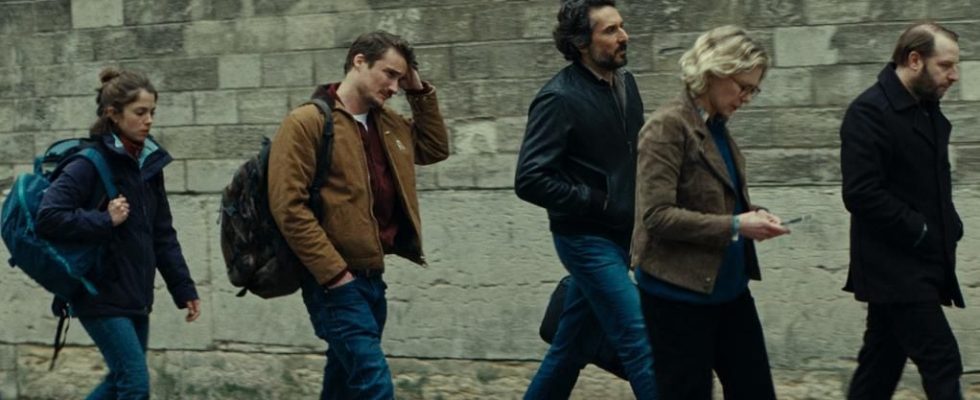It started off really well: I had gone to the wrong room. When I realized that I was watching Living, the Alix Delaporte film, it was too late, the lights had gone out, I wasn’t going to disturb my row in the middle of the credits, which had nothing to do with A family, by Christine Angot, the film I wanted to see. I had confused the private screening room at Club Marbeuf with the private screening room at Club Lincoln, two streets up.
I love these little false leaps that destiny plays on us, they offer us as many opportunities as the failed actions give rise to interpretations. And then Living gets off to a flying start, I like it. Everything takes place in the offices of a production company specializing in current affairs reports. Slightly tired backpacking journalists, in tension with the producer, and difficult to steer by a boss (Pascale Arbillot) who plays big sisters and is wary of the little intern (Alice Isaaz) who arrives with her CV which is not worth a penny, except that the glorious old man (Roschdy Zem) flashes on her: “We have to take her”… It feels like it. A group of actors who know how to do it, and a production whose theatrical effectiveness excites our eagerness to see these broken arms of the news take to the field. They bicker at length about the profession, the censorship of leaders who speak on behalf of the public, we agree, it was time for the perilous mission to arrive, because things were starting to go round in circles in the editorial room.
Due to lack of budget, if I understand correctly, only one will leave. I thought they were going to fight to get there. No way. What is going on ? Would they have become cowardly, lazy, fathers of families? Unless they simply want to stay as the title of the film announces: alive.
Faced with so much cowardice, the intern believes her time has come and offers her candidacy. You’re very nice, girl, but no. Damien (Vincent Elbaz) will risk his neck, it’s an order, there’s nothing to discuss. Only here, he goes without us, and leaves us all the more frustrated that the romance announced between the intern and the reporter is not going to be enough for us, it’s rose water.
The scenario collapses, again for budgetary reasons. The final blow is given by Roschdy Zem who performs Béjart’s choreography for the Bolero by Ravel. We are embarrassed, and not only for the memory of Jorge Donn.
I went to console myself, an hour later, at the Lincoln Club, where they were screening Bolero, the film by Anne Fontaine, which comes out on March 14 and which has the advantage of being a story lived by a real character, Maurice Ravel. But are you still real when you are the author of the most performed and famous music of all time?
To avoid answering this question, Anne Fontaine recounts a life of Ravel which does not meet the current canons of the biopic. Maurice is not Elvis. No woman, no man either. No unworthy parents or sadistic piano teacher or toxic priest. No devastating rivalry with his colleagues either, he is so humble that it borders on modesty. Even the war denies him a glorious end.
Anne Fontaine makes a film about the sadness of a man hindered, deprived of a sexual life and incapable of success. She also settled this question of the celebrity of Bolero from the credits of the film, which shows that, on our planet, there is not a moment without the Bolero by Ravel. His choice to entrust the role of this Mister Nobody to Raphaël Personnaz proves to be very judicious. The actor enters with humility into the dryness, the mystery, the unfathomable melancholy of the lazy, taciturn composer, sparing of his genius. The glory that brings him Bolero is a disaster, it drives him crazy, but no heroism in this misfortune, no melodrama, the music flows, not the tears. Ravel dies, the others are Living.
.
